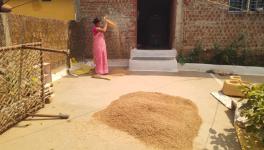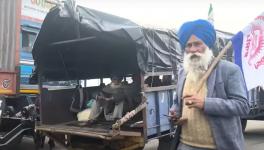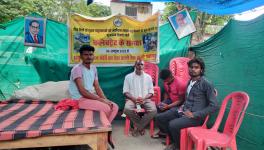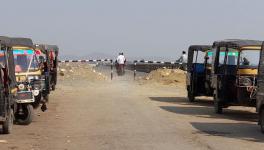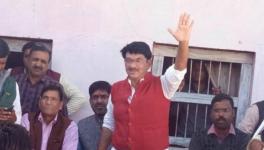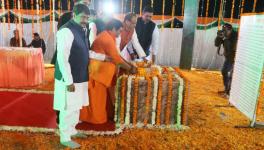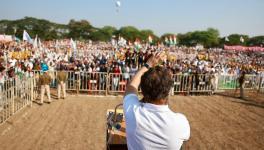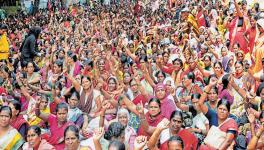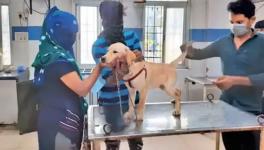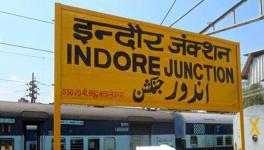COVID-19: Crematoria, Graveyards Running Out of Space in Bhopal
Bhopal: On Saturday morning, Narendra Pramar rushed to the city's biggest Bhadbhada crematorium to collect the last remains of his father, Keshav Pramar, 68, who fell prey to COVID-19 a week ago and succumbed at Hamidia Government Hospital on Friday.
But, Pramar was filled with anger when he saw the half-burnt body of his father. An anxious Pramar rushed to the crematorium manager’s office and spilled out his anger. He asked him why the chest and abdominal part of the body, which was enveloped in ashes, didn’t burn? What was the reason?
The crematorium’s manager, Lad Singh Sen, was surprised and tried to calm Pramar down. He said the wooden logs may have fallen short owing to the sudden five-six fold jump in cremations. After the squabble, they lit the body again.
Meters away, nearly four dozen people were collecting the ashes of their loved ones in clay pots with bare hands and wearing masks. All of the dead had fallen prey to the deadly virus. Meanwhile, this reporter bumped into a senior journalist of a well-known Hindi daily, who had lost his mother owing to shortage of oxygen in a hospital in the State capital on Friday.
As one walks into Bhopal’s Bhadbhada Ghat crematorium, located on the outskirts of the city, it is swamped with bodies, smoke, gloomy and teary faces and an unbearable smell of burnt bodies. The unusual smell and smoke had forced many to vomit, including this reporter.
The manager could be seen busy in issuing death certificates to the deceased's kin, the workers were running with hand carts delivering logs to the cremation stand and the priests were performing last rites for non-COVID-19 bodies.
In the past eight days, nearly 550 bodies were cremated at Bhadbhada crematorium, including 440 with COVID-19 protocols. The crematorium has a capacity to handle only 45-50 bodies a day. However, the health bulletin issued by state says that less than 20 people had died due to COVID in the same time period.
“We have nothing to do with government records or what they are saying in the daily health bulletin,” said a crematorium official, adding that we issue certificates based on the documents that the hospitals send us along with the bodies. Interestingly, the Crime Branch and CID people take daily records from us.
In the past one year, as per the crematorium’s record, more than 2,200 bodies were cremated following COVID protocols.
“Last year, when the bodies of COVID patients landed up for cremation here, we had a capacity to handle 15-20 bodies a day,” said Arun Choudhary, President, Bhadhbhada Ghat. “Seeing the numbers rising, we acquired two acres of adjacent land and made arrangements for 30 more bodies. Besides, we have begun an electric cremation centre which can cremate seven bodies a day. But, all these arrangements have been falling short, as we are receiving an average of 80-90 bodies a day since the past two-three weeks,” he said.
As per some Hindu rituals, cremation is not done after dusk, but as COVID deaths started rising in Bhopal, the district administration asked the crematoria to perform last rites till night.
At Bhadbhada, bodies begin to arrive as the clock strikes 10 a.m, mostly from Hamidia Government Hospital and Chirayu, a private hospital, close to crematorium, and flames can be seen burning till late night. In the morning, people come to collect the ashes. By afternoon, nearly two dozen bodies pile up for cremation, and by the evening, a few dozen bodies more arrive. This has become a daily affair at Bhadbhada Ghat.
Some eyewitnesses said that no rituals were being performed during the cremation of COVID bodies, as the priests were fearful of catching the infection. In addition, instead of the traditional ghee, these bodies are being doused with litres of kerosene oil for quick burning, they said.
While Pradeep Kanujiya of Bhadbhada, who lights the COVID-19 bodies, said his team of eight staff was working day and night to clear the pending bodies. Some of them had even fallen sick and their hands had become deformed in making arrangements, he claimed.
“Sometime, when the kin refuse to perform the last rites of COVID-19 bodies, we perform it. We often get help from two Muslim men, Saddam Qurashi and Danish Siddiqui, who are government servants and bring the Covid-19 bodies to us,” Kanaujiya said. He has been works in the crematorium since the past 35 years.
Recalling one such incident that took place on April 8, Kanaujiya said, a Hindu family performed the last rites of a 70-year-old Muslim woman. They did not bother to see the face of their beloved mother before cremating her and brought the wrong body. “Tension the district administration and a Muslim cleric intervened and urged the Muslim family to bury the ashes,” he said.
“I haven't seen such chaos and rush in Bhopal even during the 1984 Bhopal Gas Tragedy, which claimed thousands of lives. People just wanted to get rid of the body,” he added.
Last year, when the pandemic hit the city, the district collector Tarun Pithode and Bhopal Municipal Corporation commissioner Vijay Dutta held a meeting with crematoria and graveyard caretakers. They designated two crematoria -- Bhadbhada and Subhas Nagar -- and a graveyard in Jahangirabad to bury COVID bodies. They also offered Rs 5,000 to dispose of each such body.
“We have cremated nearly 700 bodies without charging a single penny for almost five months on the official’s assurance. The expense for each body is around Rs 3,000. But when they (administration) refused to make payments after the payment of 72 bodies (Rs 3.60 lakh), we have begun charging Rs 3,000 per body from the deceased’s kin,” said Choudhary.
“Now, the BMC commissioner has denied that any such announcement had been made in the past. He said no payment will be done. The payment of 628 bodies (Rs 31 lakh) is still awaited, we will go to court if they do not pay,” he added.
Facing difficulty in making arrangements to cremate COVID bodies, the Ghat officials have raised the charges of performing last rites from Rs 3,000 a body to Rs 3,500, about a week ago. The Ghat charges Rs 3,100 for non-COVID bodies, including providing wood and cow-dung made logs, and Rs 1,700 for electric cremation. Nearly five truckloads of wood is being used for cremating bodies every day, they said.
The crematorium officials claimed they don’t turn away those who turn up to cremate a body. “The family is already suffering by losing their loved once, and it would be painful if they suffer more if they can’t peacefully cremate them. We somehow make arrangements for them,” said Lad Singh Sen, manager of Bhadbhada.
“I have to make 70-80 certificates a day. I end up working till 11 p.m or midnight. My life is in God’s hand now,” he added.
The president of the Ghat, Arun Choudhary, said they had urged the district administration to open other crematoria for COVID bodies to lighten the burden on Bhadbhada. “We have urged the district collector, Avinash Lavaniya to open Kolar and Chola crematoria, but our request fell on deaf ears,” Choudhary said, adding that it seems that crematorium officials had refused to cremate COVID bodies in their ghats.
Subash Nagar Chita Asthal, another crematorium designated for COVID bodies, is also seeing a steep rise in the number of bodies in the past two-three weeks. The crematorium, which receives 4-5 bodies a day, has been receiving 35-40 bodies each day. From April 1 to 19, the last rites of 300 bodies were done with COVID protocols, say officials.
Since Subash Nagar Chita Asthal is located in the heart of the city, the crematorium receives bodies from the nearest People’s, JK Hospital and AIIMS Hospital. The state government does not include private hospitals death data in their daily report.
“A sharp jump has been seen in COVID-19 deaths in the past three weeks. Even during the first wave, we received 6-7 bodies a day, which has surged to 35-40 a day,” said Somraj Sukhwani, manager of Subhash Nagar crematorium.
“I haven’t received a single penny promised by the then BMC commissioner Vijay Dutta for cremation of COVID bodies,” he added.
The condition of Jadha graveyard, the lone burial ground designated to bury bodies of Muslims, is in no better condition. The problem is almost similar to crematoria.
There is hardly any place left for new graves, payments of more than 100 bodies weren't made, as promised by the district officials, and labourers who dug the graves have got blisters on their hands.
Between April 1 and 15, as many as 115 bodies were buried with COVID protocols. The graveyard, which was receiving 5-7 bodies a day, has been receiving 15-20 bodies since the past two-three weeks.
Running out of place to bury the bodies, the Municipal Corporation has provided a JCB machine to the graveyard caretakers to flatten the rocky terrain and dig up the graves.
Rehan Ahmad, caretaker of the burial ground, said he had written to the district collector to open another graveyard or provide the adjacent Wakf land to bury the bodies. “There is no place to bury new bodies. I have made my demand to the Collector. Besides, there is a patch of rocky land on the right corner of the ground. Hence, with the help of JCB, we are trying to remove the rocks and make new burial grounds,” Rehan said, adding that “we are keeping 10-15 dug graves ready in advance”.
The crematoria, graveyards are working day and night to perform the last rites of the people who are dying of COVID-19. Nearly 1,000 such bodies were disposed of in April, yet, government data says less than 50 people have died in April.
Get the latest reports & analysis with people's perspective on Protests, movements & deep analytical videos, discussions of the current affairs in your Telegram app. Subscribe to NewsClick's Telegram channel & get Real-Time updates on stories, as they get published on our website.









